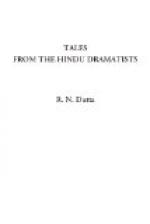The sage thereupon observes,
“If compliance with duties be your aim, make some gift to me commensurate with my merit.”
The king replies, “Oh great sage! what have I got with which to make a due gift to you? I am prepared to give you what I have——this world with all its wealth. Please accept it.”
Then the sage becomes calm and says,
“Be it so. I will not burn you up. I accept your gift of a kingdom. Now that you have made a gift, give me a fee of one thousand gold coins, commensurate with the gift. I will not accept the gift without the fee. But as you have made a gift of the world with all its wealth, you must not take the fee-money out of that world. Collect the money elsewhere.”
At this, the king is in a fix. After much thought it strikes him that it is said in the scriptures that Benares is separate from the world. So he resolves to collect money from that holy city.
Then the king placing the crown and the sceptre of royalty at the feet of the sage, obtains from him one month’s time to pay the fee and taking the queen Saibya and his son Rohitasya with him, starts for Benares. The month allowed him is drawing to a close. Not a single gold coin has been collected—to say nothing of one thousand coins. Alms is the only way of collection. Alms barely suffices for maintenance. On the morning of the last day, when he is deeply anxious for the money, the sage arrives. Seeing the latter, he almost faints.
The sage whirls his eyes and asks, “Oh Harischandra! where is my fee? Pay at once, or I will burn you up.” He replies in piteous and trembling tones, “The month will be completed by sunset. Please wait till sunset.”
The sage observes, “I will not listen to any more of your prevarications. I cannot grant your request.”
The king cries and repeatedly entreats the sage to wait till sunset.
At this the queen and his son both weep.
After many entreaties, the sage consents. Then the king again goes out a-begging, but in vain. Then he resolves to sell his person and goes about hawking himself in the streets.
No one responds to his efforts. No buyer appears. At this time, a Brahmin with a disciple, asks whether a male or a female slave is for sale and intimates that he requires a female slave.
The queen wipes her eyes and replies, “Yes, a female slave is for sale for fifty thousand gold coins. I, who am for sale as such, will obey all orders except eating table-refuse and indulging in improper intimacy with males.” The Brahmin consents to the terms laid down, pays the required sum into the hands of the king and takes away the queen. The king then bewails her thus:—
“It were far better if a thousand thunderbolts had fallen on my head. Oh my dear queen! Never even in a dream did I think that such a misfortune would befall you. You mistook a poisonous tree for a sandal-tree. Oh, how hard is my heart! It does not melt at the sight of my wife sold away as a slave. Even iron is melted by fire. Oh Providence! I can no longer bear up my sorrows. Oh Indra I break my head in pieces by thy thunderbolts.”




